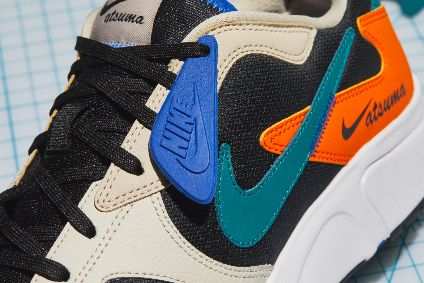
Road Ahead for Nike’s Supply Chain Transformation
For a while now Nike has been touting its efforts to create a “digital-first” supply chain, accelerated by the challenges presented to apparel and footwear brands in the last two years.
In mid-2020, the sportswear giant responded quickly to an increased consumer shift to digital engagement and started to transform its supply chain to serve consumers more directly.
From accelerating the opening of several regional distribution centers across the United States and Europe to securing a dedicated train dubbed Nike’s “Sole Train,” the company is innovating to better serve consumers now, while transforming its supply chain to power long-term growth.
“From early in the global pandemic, we knew that our recovery and return to growth would neither be linear nor intuitive,” says Andrew Campion, Nike Chief Operating Officer. “We believed that the immediate and significant shifts we were seeing in consumer engagement would be systemic. So we took decisive action and began building a digital-first supply chain to power Nike’s more direct, faster and precise service of consumers, all while prioritizing sustainability.”
Here are four things to know about how Nike is changing the supply chain game.New Regional Service Centres Increase Capacity, Speed and Precision More Sustainably.
Prior to winter 2020 in North America, Nike had operated almost entirely through centralised, national distribution centres in Memphis, Tn. Today, in addition to transforming its Memphis distribution centres into omni-channel facilities, Nike is also employing a multi-node network including new regional service centres outside of Los Angeles to serve the West, in Bethlehem, Pa., to serve the East and in Dallas to serve the South. In Europe, Nike added a regional service centre in Madrid to begin evolving its distribution network beyond its European Logistics Campus in Belgium.
Nike’s multi-node regional distribution network is supported by advanced demand-sensing and inventory optimisation technology platforms that are increasingly helping Nike predict, plan and shape one-to-one consumer demand.
“As we continue building a digital-first supply chain globally to serve consumers more directly at scale, we have already tripled our capacity to serve digital consumers in North America and Europe, the Middle East, and Africa over just the past two holiday seasons,” says Campion. “And we are just getting started.”
Automation and Technology Are Changing How Nike Operates in Service of the Consumer.
“At Nike, adversity has always been a catalyst for innovation and fuelled our competitive separation, and the past two years have been no different,” says Campion. “The challenges and constraints imposed by the pandemic have driven our teams to transform how we serve consumers through the implementation of new technology platforms, automation and process improvement in our operations.”
Using AI and machine learning, Nike is leveraging technology to forward-position the products that consumers love most and deliver faster, more precisely, and without compromising sustainability. In addition to the use of regional service centers, services such as Buy Online, Pick Up in Store (BOPIS), Ship to Store, the No Rush Shipping option for consumers prioritizing sustainability, and Direct Order Drop are helping ensure consumers have, as Campion says, what they want, when and where they want it.
Within distribution centres, Nike has also deployed more than 1,000 “cobots” (collaborative robots) to aid in the sorting, packing and movement of products, increasing speed in order processing, alleviating physical challenges and allowing focus on higher-value activities.
Efforts to Package, Ship and Refurbish Product More Sustainably Benefit the Consumer and the Planet.
Nike believes in the power of sport to move the world forward. By reducing the number of split packages and leveraging pop-up cartons that are made of 65% recycled content and 35% virgin material, Nike has optimised its packaging for the benefit of consumers and the environment long term.
“At Nike, our mission is to provide inspiration and innovation to every athlete* in the world,” says Campion. “We also believe that we must protect the planet and the future of sport, by creating, testing and building momentum around consumer and operational solutions that address the issues we face relative to carbon, waste, water and chemistry.”
Ground-only shipping, available across the continental United States, provides a less carbon-intensive option than air freight shipping. Plus, this no-rush option also gives Nike teams extra time to prepare an order and get it out the door. Finally, sustainably-minded initiatives like Nike Refurbished extend the life of eligible products by taking gently worked and slightly imperfect kicks and refurbishing them by hand to offer at select Nike Factory, Nike Unite and Nike Community stores.
Nike Focuses on Powering the People Who Power Nike.
“I have always believed that at Nike, it’s both business and it’s personal,” says Campion. “Simply put, the global supply chain is all about people and at Nike our supply chain is powered by an extraordinarily talented and diverse team around the globe.”
During the pandemic, Nike has prioritized the health, safety and well-being of its teammates above all else. That began with enhanced COVID protocols and COVID sick leave and pay continuity for essential workers in manufacturing, distribution centers and retail stores. Today, that extends to investments in career development, training and community volunteer opportunities. In the U.S., Nike provides employees with resources through a partnership with University of Memphis offering online degree programs focusing on personal achievement and career development.
“Based on an operating and supply chain model conceived by Phil Knight in business school, we have effectively and efficiently served and provided innovation to athletes* for the past 50 years,” says Campion. “Today our teams are fuelling a supply chain and technology transformation that will enable Nike to more directly serve consumers over the next 50 years. Their resiliency, strength and creativity will continue powering Nike. Our teams at Nike have been and continue to be our single greatest competitive advantage.”
Last month, Nike was named the world’s most valuable apparel brand based on its brand value.



